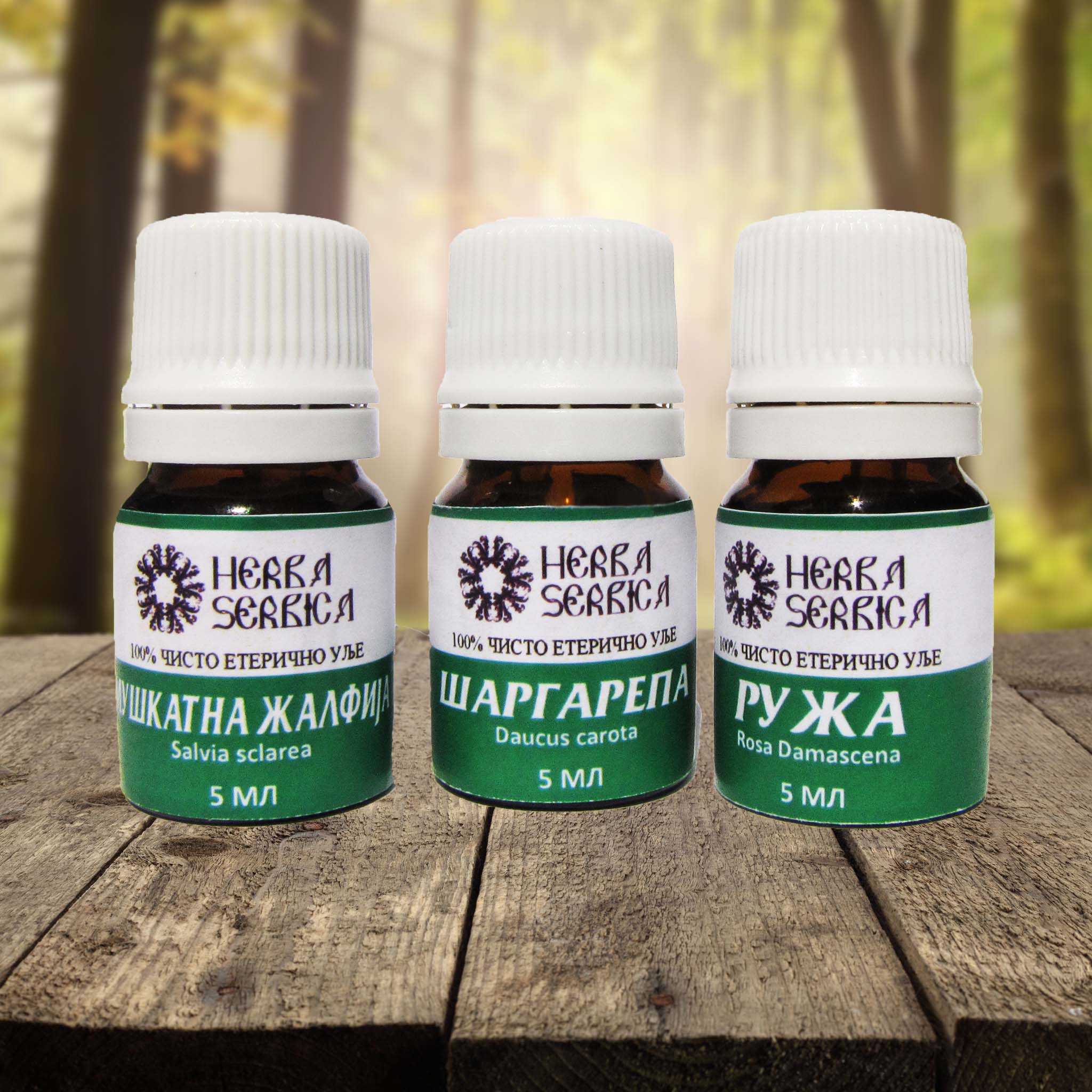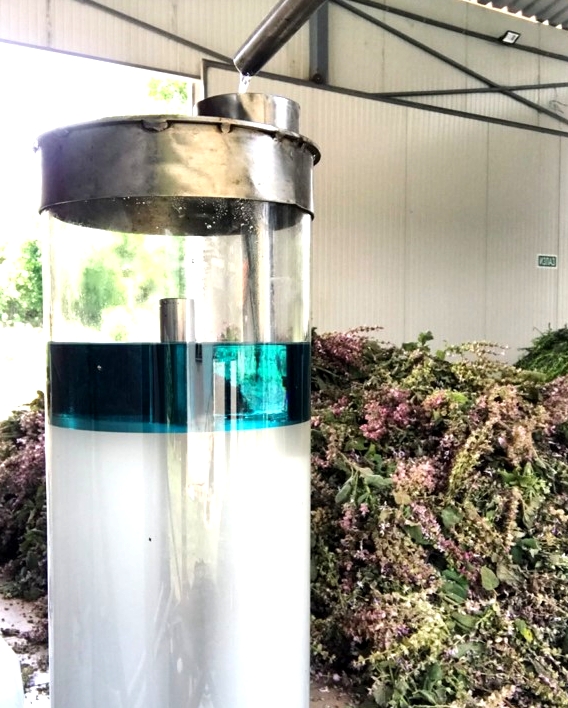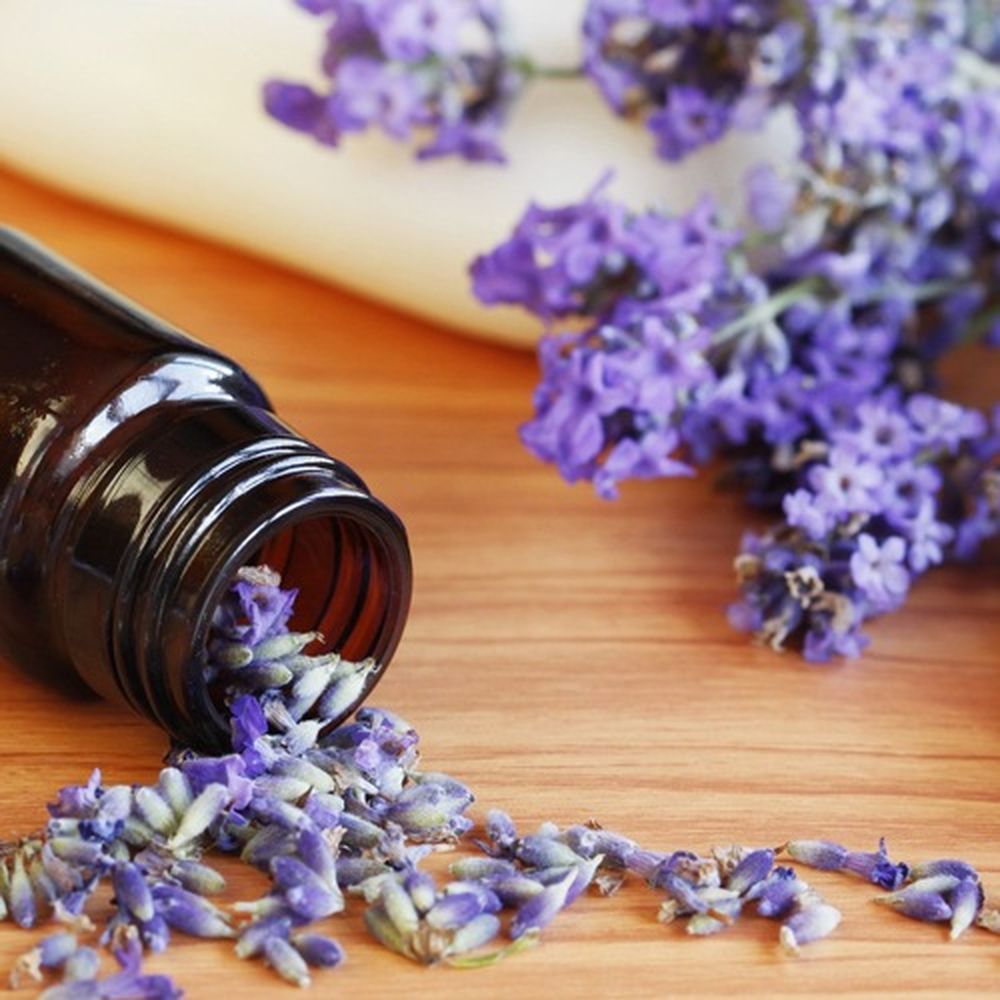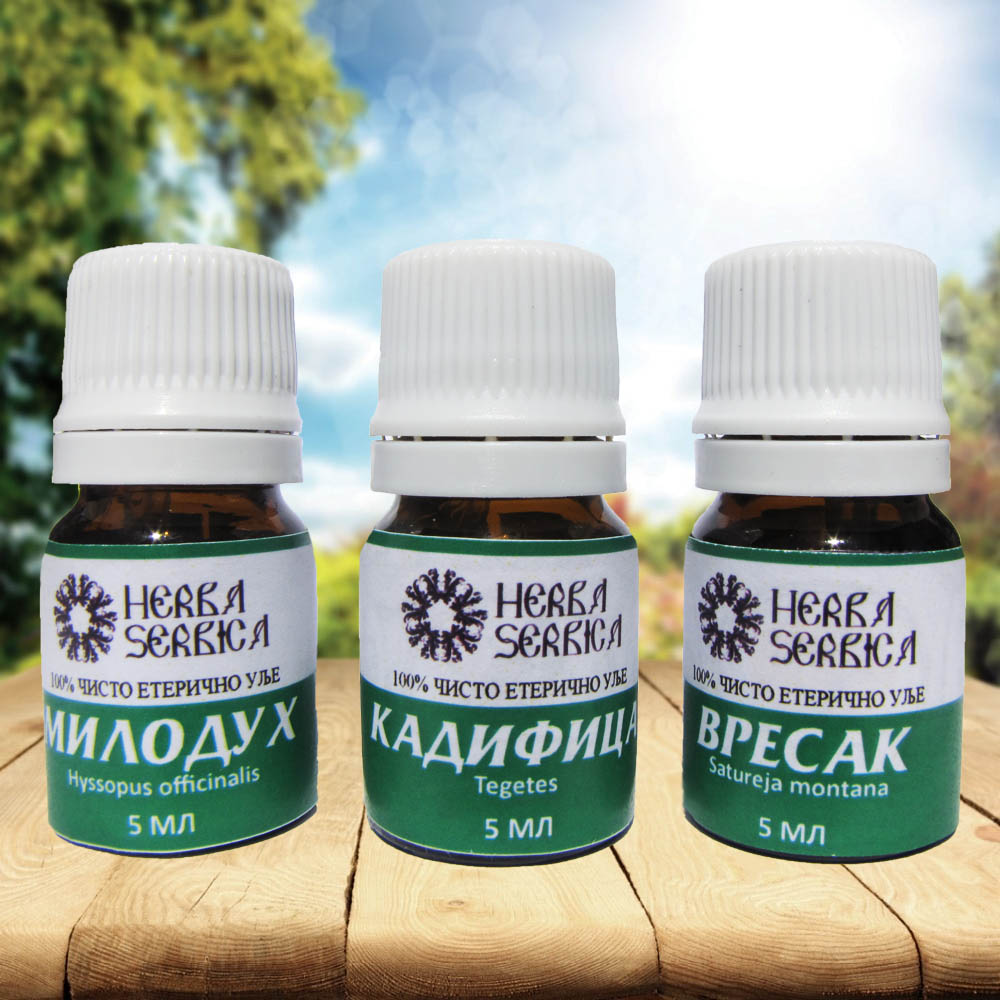Essential oils are mixtures of volatile, biologically active compounds obtained from plant material, most commonly by distillation and less often by pressing (citrus peel).
Although we call them oils, their molecular structure and consistency is very different from the vegetable oils we are used to. Essential oils are non-greasy, volatile liquids of extremely complex composition. These are substances that have several hundred components.
Unfortunately, oils of low quality are present on the market, so you should be very careful when buying. How to identify quality essential oils? How to obtain essential oils? In order for plants extracts to be called essential oils, they must be obtained in one of the following ways:
-distillation (the vast majority of essential oils)
– pressing (citrus oils)
-direct heating of the plant mass without distillation (a rare method of production)
Other extracts obtained by other means are not called essential oils.

Eterično ulje muškatne žalfije, šargarepe i ruže.
View The Offer of Serbian 100% Natural- High Quality
Essential oils oregano, basil, rosemary, lavandula, mynth, fenel, tegetes, thymus..
Concretes are formed by extracting fragrant components from fresh or dried plants using an organic solvent. If the extraction is done from vegetable resins then the extraction product thus obtained is called resinoids. If the concrete or resinoids undergo further alcohol extraction with ethanol, the so-called absolut.
Synthetic or natural mixtures or mixtures of fragrances with natural essential oils should not be called essential oils, only fragrances (INCI: fragrance). There are also completely natural fragrances used in natural cosmetics, but they are not used in aromatherapy: you will not put them in a diffuser, aroma lamps, inhalation or use in an aroma massage.
Distillation
Distillation independent of the types of distillation (water-steam distillation, steam distillation, distillation under reduced pressure), distillation devices consist of: a part with water in which the water will be heated until steam is released from the plant material through which steam will pass and a vessel in which water vapor and essential oil will cool and transition back to liquid form (condense). In addition to the essential oil, an aqueous layer saturated with the essential oil, that is, hydrolate or flowering water, is formed. Distillation is just not easy. Each plant is distilled in a different way. Some are distilled fresh, some chipped, some dry and chipped … There is also the hardness / softness of water, temperature, duration of distillation, pressure, etc.
View The Offer of Serbian 100% Natural- High Quality
Essential oils oregano, basil, rosemary, lavandula, mynth, fenel, tegetes, thymus..
Cold pressing
Cold squeezing is the process by which citrus essential oils are obtained. The tiny needles bark out and then undergo straining. The oils thus obtained are called essential aromatherapists to distinguish them from the essential oils obtained by distillation. They are not completely volatile as the oils obtained by distillation with water vapor, so they leave stains where they drip after evaporation.
How do essential oils work?
One essential oil contains hundreds of chemical compounds, so the effect of essential oils on the human body is not yet fully understood. It is known that the chemical components of essential oils have a pharmacological effect on tissues and organs, and the hormonal and nervous systems. Essential oils, by their scent, affect mood and emotions too – through the receptor in the nose of the information carried by the scent directly goes to the brain, and there is also a hidden pheromone action. Also, every oil has its own energy, which can act on the human energy field. Because of this ability to act on several different levels at the same time, essential oils ideally serve a holistic approach to man and his needs. A holistic approach tries to balance all aspects of the personality and thus act to preserve the health of the individual.
How to use essential oils?
Essential oils are used in various ways: inhalation, dermal, oral, vaginal and rectal … They are used in baths, cosmetics, cooking … About ten years ago, because of the predominant English version of aromatherapy, ours was the most common method of dermal application. through aroma massage and through aroma lamps.
After several years of presence of scientifically based aromatherapy, where we were introduced to inhalation, diffusers, aroma cosmetics and oral, vaginal and rectal administration (these three methods are carried out by experts).

Postupak dobijanja eteričnog ulja destilacijom
View The Offer of Serbian 100% Natural- High Quality
Essential oils oregano, basil, rosemary, lavandula, mynth, fenel, tegetes, thymus..

Essential oils and skin
Essential oils, due to their small molecules and lipophilicity, penetrate the skin very quickly, so they are almost never used undiluted. To reduce the rate of entry, essential oils are applied to the skin diluted in vegetable oils. Vegetable oils are fatty oils, such as almond oil, olive oil, avocado oil and the like. In doing so, we achieve several goals: we reduce the possible skin damage that can occur due to the application of pure essential oil on the same, prevent the sudden entry of essential oil into the body (some oils contain toxic components, and sudden entry into the body can cause unpleasant side effects). Also, slower absorption allows longer therapeutic components to be present in the blood or on the target tissue.
Inhalation with essential oils
Inhalations primarily help with respiratory distress, colds, flu, sinusitis, but inhalation of essential oils is also recommended for anxiety, depression, PMS, for better concentration and memory, for calming, better sleep … we still avoid direct inhalation in humans prone to bronchial spasms, such as in asthma, and in infants. Extra caution is needed in chronic obstructive pulmonary disease and in severe acute inflammation where it is sometimes better to avoid inhalation so as not to irritate the mucous membrane. In these cases, we use the essential oils dermally. There are several ways to inhale essential oils.
Important
Essential oils have a characteristic, strong taste that can stimulate a strong reaction of the body, so they should always be taken in a diluted form. It is not recommended for children, pregnant and lactating women and people who are sensitive to essential oils. Concomitant use of oregano oil and plants of the same family as Hypopus (Hyssopus off.), Majoran (Origanum majorana), nana (Mentha piperita ‘), Basil (Ocicum basilicum), Sage (Salvia off.) Are also not recommended. te lavender (Lavendula off.). Avoid contact with larger superficial wounds, eyes, genitals when used externally. Do not apply essential oils directly to juveniles and skin tumors!
Linkovi
ROBNA KUĆA
UVOZ IZ SRBIJE
SADNICE SRBIJA
PREVOZ DO AERODROMA
INFORMACIJE
USLOVI KORIŠĆENJA
NAČINI KUPOVINE
USLOVI ISPORUKE
PRAVO NA ODUSTAJANJE
NAJČEŠĆA PITANJA
kontakt
Prvomajska 2/E
11080 Zemun – Beograd
Srbija
+381 69 393 6996
+381 64 2389 704
[email protected]

